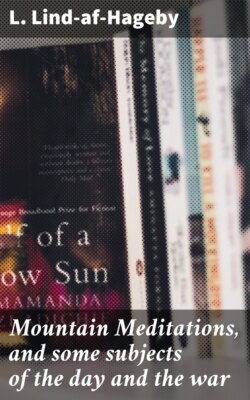Mountain Meditations, and some subjects of the day and the war

Реклама. ООО «ЛитРес», ИНН: 7719571260.
Оглавление
L. Lind-af-Hageby. Mountain Meditations, and some subjects of the day and the war
Mountain Meditations, and some subjects of the day and the war
Table of Contents
MOUNTAIN-TOPS
THE BORDERLAND
REFORMERS
NATIONALITY
RELIGION IN TRANSITION
Problems of the Peace
After-War Problems
The Choice Before Us
America and Freedom
Democracy After the War
The Conscience of Europe—The War and the Future
The Free Press
Rebels and Reformers
The Making of Women
Old Worlds for New
The World Rebuilt
The Scottish Women's Hospital at the French Abbey of Royaumont
The Diary of a French Private
Battles and Bivouacs
My Experiences on Three Fronts
An Autobiography
My Days and Dreams
Bernard Shaw:
The Man and His Work
The Path to Rome:
A Description of a Walk from Lorraine
Edward Carpenter's Works
Works by Maurice Maeterlinck
ESSAYS
PLAYS
Отрывок из книги
L. Lind-af-Hageby
Published by Good Press, 2019
.....
But we—how proud I am of that “we”!—who have chosen hard labour on the mountain know something which the mere visitors (though they be members of many Alpine Clubs) know not. We have a sense of home which no other habitation can impart—a passionate love of the soil, a unity with the little patch that is our own, bringing joys undimmed by any descriptions of other-worldly possessions. Our trees may be wrecked by an avalanche, our garden plot may be obliterated by a land slip; the stone walls we build up in defiance of the snow are always pulled down by mountain sprites. Our agriculture is precarious, and every carrot is bought by the sweat of our brow. The struggle keeps pace with our love—there is a tenfold sweetness in the fruit we reap. And when fate compels us to leave our mountains we are pursued by restlessness. We know no peace, no home elsewhere. We do assume the airs of Victor Hugo's cretin when we are placed face to face with the riches of Crœsus or the splendours of Pharaoh.
We must reluctantly admit that the phenomenon of cold indifference to mountain scenery may occur without any corresponding degree of idiocy. In the Playground of Europe, Leslie Stephen told us that a man who preserves a stolid indifference in face of mountain beauty must be of the “essentially pachydermatous order.” He commented at length on the peculiar temperament of those who have expressed dislike of his perfect playground—Chateaubriand, Johnson, Addison, Bishop Berkeley. Bishop Berkeley, who crossed Mont Cenis on New Year's Day 1714, complained that he was “put out of humour by the most horrible precipices.” There is huge comfort to be drawn from Stephen's pages descriptive of the “simple-minded abhorrence of mountains,” and from his categorical declaration that love of the sublime shapes of the Alps springs from “a delicate and cultivated taste.” But we are puzzled by the presence outside the pale of some who cannot rightly be called “pachydermatous.” I am turning over the pages of Sarah Bernhardt's autobiographical revelations. “I adore the sea and the plain,” she writes, “but I neither care for mountains nor for forests. Mountains seem to crush me, and forests to stifle me.” Strange that the high priestess of expression, the interpreter of every phase of human passion and sorrow, she who dies terribly twice a day, and mercilessly conducts us to the attenuated air and dizzy heights of intense emotion, should feel no kinship with the mountains. It may be that they are antagonistic to the fine arts of simulation and will brook no companionship of feeling that is not real. And her stage-worn heart is certainly not in alliance with Fiona Macleod's Lonely Hunter.
.....